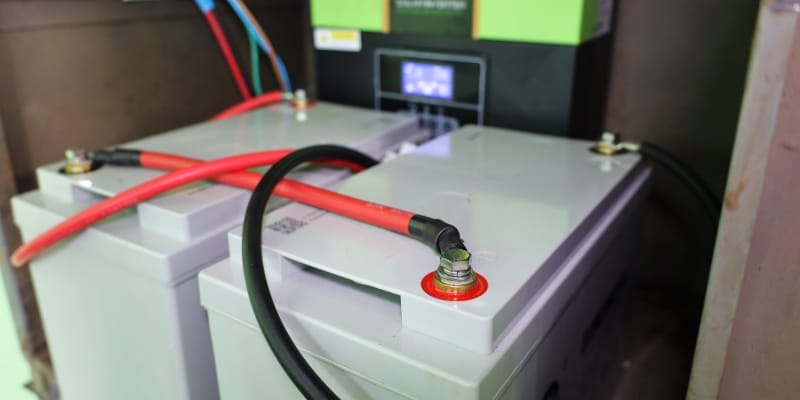- Home
- About us
- Products
- Dealer Enquiry
- Contact Us
- 044 -2486 1994
- +91 99623 98222
- sales@nantech.in
- REQUEST A QUOTE

With inverter battery performance at the core of effective energy management, grasping the various elements influencing its longevity and function is essential.
This guide delves into essential considerations to help prolong the lives of inverter batteries and ensure they deliver the best performance over time. From battery types and quality to charging habits and upkeep, plus how inverter efficiency affects them all, each aspect contributes to the overall effectiveness of your power solutions. Journey with us as we uncover how to manage these components for better inverter battery performance.
Inverter batteries are available in three types and have key differences in performance and lifespan.
The DoD or Depth of Discharge indicates how much capacity has been utilised. Here’s how this parameter influences the inverter battery performance and life:
The ideal DoD levels for lead-acid batteries are up to 50%, and lithium-ion is below 80%.
Effectively managing the DoD enables businesses to ensure their inverter batteries deliver top performance and longevity, aiding eco-friendly efforts.
Extreme hot and cold temperatures significantly impact inverter battery chemistry, influencing efficiency and effectiveness.
Industry insights suggest that the optimal temperature range for inverter batteries is between 20°C and 25°C. Batteries within this range maintain their integrity, ensuring consistent performance and longevity.
For optimal temperature conditions, batteries should be placed in well-ventilated areas away from direct sunlight or severe cold. Proper ventilation ensures that excess heat generated during battery operation is effectively dispersed, preventing overheating and related risks.
Also Read: Why Do Inverter Batteries Die So Soon?
The inverter’s efficiency is pivotal in determining the health and longevity of your inverter battery. At the efficiency core is the inverter's capacity to transform DC (direct current) from the battery into usable AC (alternating current) with minimal energy loss.
High-efficiency inverters boasting conversion efficiencies of over 95% ensure most of the battery's stored energy is usable. Minimising energy loss is crucial to maximising battery runtime and, by extension, its overall performance and life.
Another essential aspect is the power factor, which indicates how effectively the inverter converts electrical power into sound work output.
Inverters with a high power factor waste less energy and put less strain on the battery, leading to better battery health over time. This efficiency ensures the battery can deliver and receive power more effectively, supporting its longevity. Efficient inverters also handle heat generation well. Excessive heat harms battery health, speeding up degradation and shortening battery life. By generating less heat, high-efficiency inverters reduce thermal stress on batteries, aiding their preservation and extending their service life.
Adhering to optimal charging practices is critical to boost the average life of an inverter battery. You should:
Overcharging leads to electrolyte loss, diminished capacity, and possible harm. It can also increase internal pressure and temperature, risking damage to the battery structure.
Undercharging leads to sulfation, where lead sulfate crystals accumulate on the battery plates. This hinders the battery's ability to charge and discharge effectively, significantly diminishing its lifespan and power delivery capability.
Advanced charge controllers are at the forefront of managing the charging process, offering numerous advantages for maintaining inverter batteries.
The following tips are essential to extending your inverter battery lifespan:
By taking a proactive stance on maintenance, you ensure your inverter battery runs at peak efficiency, supporting uninterrupted power supply and your enterprise's commitment to green practices.
Ensuring your inverter battery achieves peak performance involves more than selecting the right technology. By prioritising these aspects, you can significantly enhance the operational efficiency of your power systems, contributing to cost savings and environmental sustainability goals.
Remember, consistent maintenance and brilliant charging routines prolong your battery's life, reflecting your dedication to eco-friendly solutions. If you seek expert advice when choosing and sustainably managing your power solutions, Nantech Power Systems Pvt. Ltd, one of Chennai’s leading UPS dealers, is here to assist.
Secure your power supply and ensure efficient, reliable, and streamlined operations!
A Head-to-head Comparison Between Flat Plate & Tubular Batteries
Tips to know before recycling inverter UPS batteries
Exide vs Microtek vs Luminous
How Useful Is The Inverter?
Maximising Inverter Battery Performance: Key Factors to Consider
Role of UPS Systems in Critical Industries
Tamil Nadu Solar Power Subsidies: Everything You Need to Know
On-Grid vs. Off-Grid Solar Systems: The Ultimate Decision Guide
Can Solar Street Lights Work in Winter Efficiently?